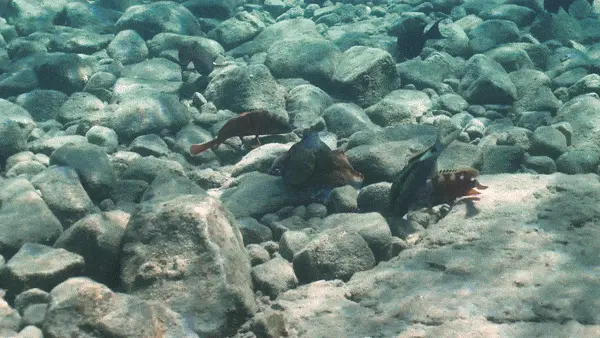Watch Octopuses Team Up With Fish to Hunt—and Punch Those That Don’t Contribute
The collaboration across species reveals a surprising social behavior of octopuses, researchers say
:focal(600x340:601x341)/https://tf-cmsv2-smithsonianmag-media.s3.amazonaws.com/filer_public/6a/cc/6acc2d2d-32b9-48fa-92ec-418681f5706c/octopus.jpg)
In the waters of the Red Sea, fish and octopuses are forming an unlikely alliance: They’re joining forces to track down prey, establishing a hunting operation that’s potentially more effective than either creature working alone.
With the octopus leading the charge, fish scout for hidden prey and signal where to capture a smaller fish or mollusk. But if freeloading fish are hovering around, looking to benefit from the hunt without contributing, the octopus punches them away, according to new research.
“The octopus basically works as the decider of the group,” Eduardo Sampaio, a researcher at the Max Planck Institute of Animal Behavior and lead author of the study, tells Nature News’ Helena Kudiabor.
The study, published on Monday in Nature Ecology & Evolution, brought a new type of collective behavior to light. Octopuses, often thought of as solitary creatures, led a group of various species of fish and discerned which ones were and weren’t helping.
“Nobody really knew that octopus have this sophisticated social life—not with other octopus, but with other species,” study co-author Iain Couzin, an evolutionary biologist and director of the Max Planck Institute of Animal Behavior, tells Popular Science’s Lauren Leffer.

Sampaio and his team collected around 120 hours of underwater footage during dives in the Red Sea. They filmed 13 scenes that showed a big blue octopus (Octopus cyanea) hunting with different fish species. And the various animals appeared to have distinct roles in the operation.
“These fish function as an extended sensory system for the octopus,” Sampaio tells Vice’s Mirjam Guesgen. “The octopus can basically sample or explore the environment just by watching them.”
One of the octopus’s biggest helpers was a species of fish called the blue goatfish (Parupeneus cyclostomus), which had strong team hunting skills. They would explore new crevices and show the octopus where to find prey by hovering over the area or moving from the crevice to the octopus and back.
“If the group is moving, everyone’s happy. It’s all good,” Sampaio tells National Geographic’s Melissa Hobson. Sometimes, other species of fish, most often blacktip groupers (Epinephelus fasciatus), weren’t as helpful and seemed to be waiting for others to do the work. In these cases, they would receive a jab from the octopus.
But it wasn’t just the octopus that was controlling members of the group—some fish would also displace others by darting toward them. Fish did not show aggressive action toward the octopus, according to the paper, suggesting the cephalopod was the dominant individual. The octopus seemed to decide whether or not the group would move to a new area.
When the hunting party identifies hidden prey beneath a rock, the octopus wraps its body around the stone, trapping the animal. This is standard hunting behavior for the big blue octopus, but when pursuing prey alongside fish, the cephalopod performs this wrapping action fewer times, the team found, presumably saving energy.
By getting deeper insights into collective animal movements, researchers can help conserve other species, says Marina Papadopoulou, a computational biologist at Swansea University in Wales who wasn’t involved in the study, to the New York Times’ Elizabeth Preston.
Still, the videos couldn’t capture whether the individuals in the hunting group remained the same. For future research, Sampaio and his team want to determine if the animals recognize each other, as it would add even more nuance and complexity to the interaction.
“Does this octopus like to hunt with blue goatfish generally, or does it really want to hunt with Martha, who is a good hunter, and not Steve, who is lazy?” he says to Popular Science.
The researchers have another gap they’ve been trying to fill: It’s difficult to determine the benefit each species is getting, or more specifically, who is eating the prey. The octopus gets the most benefit, they hypothesize, compared to hunting solo. Some fish get to make a catch if the prey escapes the octopus, per the New York Times. But they’re unsure if all fish get equal amounts.
For other scientists, like Hannah MacGregor, a marine animal-behavior researcher at the University of Cambridge in England, the work is already “really fascinating,” she tells Nature News, and it helps researchers gain a better understanding of “what would drive, in this case, groups of completely different species to stick together.”
/https://tf-cmsv2-smithsonianmag-media.s3.amazonaws.com/accounts/headshot/headshot_2_thumbnail.png)


/https://tf-cmsv2-smithsonianmag-media.s3.amazonaws.com/accounts/headshot/headshot_2_thumbnail.png)